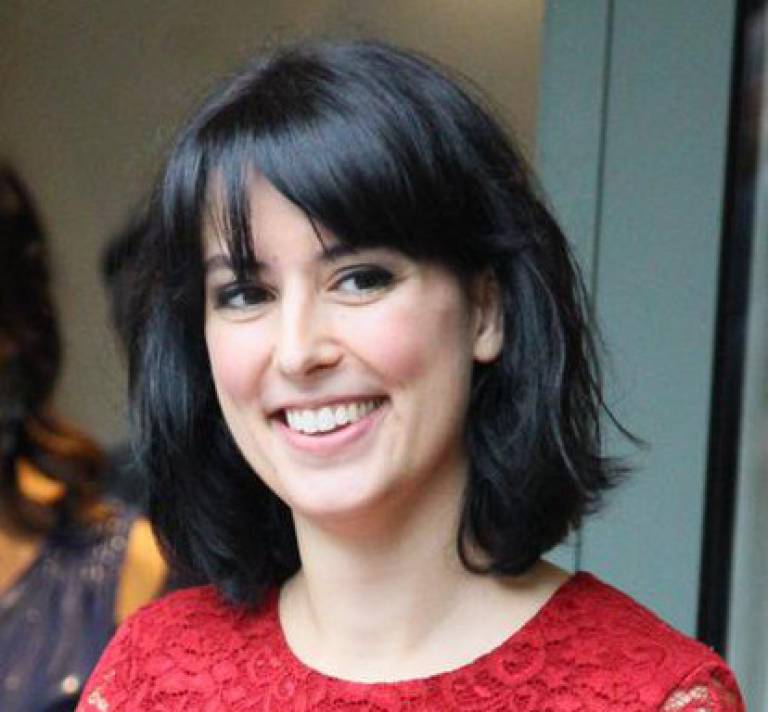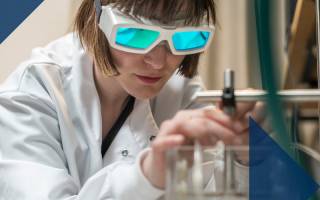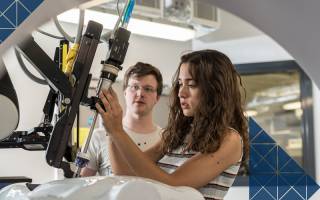PhD Alumni Spotlight: Dr Emma Biondetti
Dr Emma Biondetti is a Postdoctoral Researcher in Quantitative Magnetic Resonance Imaging who completed her PhD in MRI Physics in 2019.

14 January 2021
What did your PhD research at UCL focus on, and what led you to this field of study?
During my PhD, I developed and optimised magnetic resonance imaging (MRI) methods to investigate a property called the magnetic susceptibility. This is a property of all materials that describes how they behave when placed inside a magnetic field. In body tissues, magnetic susceptibility is particularly interesting, because we can exploit it to gain information on iron, calcium or deoxyhaemoglobin content, just to name a few substances. The concentration of these substances can be altered in disease. As a clinical application of my PhD, I investigated how we can use MRI magnetic susceptibility mapping to investigate the oxygenation of venous blood in a cerebrovascular disease (arteriovenous malformations) in which normal venous oxygenation is altered.
My first contact with MRI research was during my MSc studies (at the University of Padua, Italy), when I obtained a grant from the EU-funded Erasmus programme to work in Prof Claudia Wheeler-Kingshott's lab at UCL for about six months (October 2013-April 2014). Here, I conducted a research project on MRI in multiple sclerosis. Before then, I had never considered studying for a PhD. However, I thoroughly enjoyed the research process itself, as, for the first time, I had to apply my theoretical knowledge to find answers to novel questions. Moreover, I became fascinated by MRI, as this is a technique with the potential of understanding brain disease and changing people's lives.
What’s the most important thing you learned during your time at UCL — academic or otherwise?
Studying for a PhD thought me a lot about my own personality. I understood that I am resilient as for each successful result I had at least ten failed attempts. And some ideas never worked at all. For me, the real learning happened when I was forced to rethink a scientific question, and understand why my initial hypothesis hadn't worked. Research is a very humbling process.
Can you tell us a bit about your current role and future plans – where do you hope your future career might take you?
My current plan is to pursue a career in academic research and, one day, I would love to start my own research group.
After defending my PhD thesis, I moved to France for my first postdoctoral position at the Paris Brain Institute in Prof Stéphane Lehéricy's lab. Here, I spent the last two years studying MRI applied to Parkinson's disease. This experience has been extremely useful to understand a more clinical side of MRI research, as I have worked in a truly multidisciplinary environment comprising physicists, radiologists, and neurologists, and focussing on a large prospective study that aims to understand the earliest phases of Parkinson's.
I have now moved back to my home country (Italy) to take up a new postdoctoral position at the University of Chieti-Pescara in Prof Richard Wise's lab, where I will be working on MRI methods to study brain physiology.
Changing labs and, sometimes, countries is an essential part of this type of career, especially in its early phases. Changing city every few years is tiring but extremely rewarding, as one can learn several languages and call "home" several places in the world.
How important do you think your PhD studies and time with this department is (or will be) for your career?
Studying for a PhD at UCL has been extremely important for my current career, as the Medical Physics & Biomedical Engineering department — and UCL in general — are world-renowned for MRI research. Thanks to this central role of UCL researchers in the MRI scientific community, I developed an excellent professional network early on, I had the opportunity of attending high-quality talks delivered by experts in my field several times per month, and, in general, I was exposed to the most recent innovations in my field. I still collaborate with several researchers at UCL, including my former PhD supervisors, Dr Karin Shmueli and Dr David L. Thomas, and I believe that the professional network that I established early on at UCL will keep being the foundation of my future professional relationships.
What do you find most inspiring, exciting or motivating about your broader field of research?
In general, I find the physics of MRI fascinating: it is based on the elegant application of very complex physical principles (image encoding in k-space, to name one example). Broadly speaking, I appreciate the huge potential of MRI for understanding brain structure and neurological disease noninvasively, as opposed to technologies using ionising radiation such as X-ray imaging.
What would be your advice to someone who is considering doing a PhD in this Department (or in general)?
First, I would give what I found to be the best advice for myself: choose a subject that you love. There will be several times during a PhD when you'll feel demotivated, which is totally normal as we're talking of a long project (3+ years) characterised by several ups and downs. On some days, being passionate about your subject of study could be the only thing that keeps you going.
Second, I would strongly encourage all students to get involved in the departmental life and UCL life in general. I built some of my most solid friendships during my PhD, and found that the department really is a very friendly place (everyone, including the admin and staff members!). Also, cultivating one or two interests outside the PhD programme (it could be sports, charitable activities or getting involved with one of the student societies) really helps to manage the stress of doing a PhD.
 Close
Close




